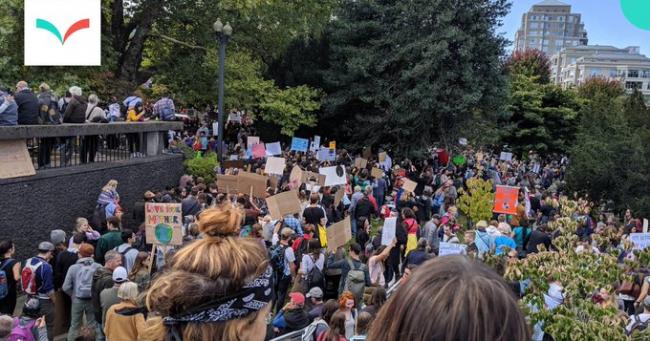Articles Menu

Oct. 19, 2020
Harrison Johnston remembers standing in a little coffee shop last September, watching in awe as a massive crowd marched from Vancouver City Hall to the Central Library downtown.
Then a lead organizer with Sustainabiliteens, a youth-led climate movement in Metro Vancouver that coordinated the Sept. 27, 2019, climate strike, he said he had only expected up to 20,000 people. Instead, the protest became the largest in the city’s history, with over 100,000 people filling the streets.
“We didn’t need to be doing anything,” he said. “There was just so much power in this mass of people there.”
This fall, climate organizing is looking different for the Sustainabiliteens, who first came together in 2018 as part of the school-strike movement inspired by Greta Thunberg.
The COVID-19 pandemic has severely limited the size of climate rallies — like those ahead of the federal Speech from the Throne — that Sustainabiliteens have been able to hold with other youth-led climate groups. But with NDP leader John Horgan calling a snap election in B.C., organizers see a chance to pursue a more direct approach: get climate activists elected.
For many young organizers, trying to engage politicians about the need for bold climate action can be a discouraging exercise.
Johnston, who is running as a Green candidate in North Vancouver-Seymour, recalled feeling frustrated in the months following the climate strike. Despite the event’s historic turnout, he said he didn’t see it having a major impact on government actions, pointing to the province’s large fossil fuel subsidies and the police incursion on Wetʼsuwetʼen territory in support of the Coastal GasLink pipeline.
“I really came to the decision over the year since then that I have no faith in the people who are currently in our government to be fighting for my future, the future of my generation and my children’s generation,” he said.
“And if I want something to change in the government, I should probably go try to do it.”
Sustainabiliteens organizers Rebecca Hamilton and Naia Lee agree, saying that the movement has now shifted its effort to getting “champions for climate justice” into office.
“We’ve really realized that we’re done with trying to convince politicians about the livelihood of our generation,” said Hamilton.
With many of their close to 200 organizers still under the voting age, Sustainabiliteens are instead signing up their members to volunteer for candidates who align with their goals, like Johnston. They are also using their platform to endorse and draw attention to candidates who are committed to climate justice actions like ending fossil fuel subsidies and actively pursuing social justice.
As of Oct. 18, Sustainabiliteens have publicly endorsed five candidates from the NDP and Green parties. But there are still a few endorsements pending, according to Hamilton.
“Then hopefully once they’ve been elected partially through the power of our volunteers and organizers, we’re going to spend the next four years holding them accountable as they work in the legislature,” Lee said.
Campaigning during a pandemic has brought limitations and opportunities. According to Johnston, COVID-19 is disrupting many traditional staples of campaigning. He and his team haven’t been doing any door-knocking, which is challenging for a newcomer who is trying to get his name and message out in the riding.
But he also pointed out that COVID-19 is showcasing a way to mobilize people around the climate crisis, an issue that requires similarly urgent responses.
“It's definitely given us opportunities to choose a different direction,” Johnston said. “Now we really have an opportunity, as our economy is going to need massive stimulus. We really have an opportunity to be shifting the way our economy has been functioning to a greener, more just economy.”
Tesicca Truong, a Sustainabiliteens-endorsed NDP candidate for Vancouver-Langara, added that there are fewer excuses now for not pushing bold policies for the recovery process. She said responses to the numerous crises B.C. faces — including the climate crisis and COVID-19 — “need to centre those who have been disproportionately impacted and those who have been historically and continue to be marginalized,” such as Indigenous communities.
“A lot of us like just to dream again politically, to see that what we’ve been told is not possible is actually possible and possible within weeks’ time at the federal level and international level,” Truong said.
“Together, collectively, we have agency.”
With less than a week until Election Day, it remains to be seen how successful Sustainabilities-endorsed candidates will be, particularly for Truong and Johnston, who are both running against B.C. Liberal incumbents who recently served as the Official Opposition.
And while the movement’s organizers remain hopeful, they are also already looking beyond the election.
According to Hamilton, Sustainabiliteens will be shifting away from climate strikes partly because of COVID-19 restrictions and partly to broaden their engagement with adult supporters and solidarity work with Indigenous sovereignty movements.
“Something we talk about a lot is that we need to bring climate into everything,” Lee added. “Often, I think the climate movement is a little bit of a silo.”
The movement is also entering schools and setting up clubs across Metro Vancouver to teach youth about climate justice and direct action skills, while facilitating a shift away from focusing only on individual actions such as recycling. Hamilton said they are currently developing a multi-week training program to give young people across the country the skills to organize their local communities.
Ultimately, organizers like Lee and Hamilton, who have deferred university to commit to climate organizing, are giving the movement their all — during and after the election.
“We all spent a lot of the last two years of high school mostly doing climate organizing and we all want to be able to go full in because it just feels so urgent, said Hamilton.
“Going to school is about preparing for a future, but we feel the biggest way to prepare for our future is to help stop climate change.”
[Top photo: Climate Strike Vancouver - photo: Christopher Porter]